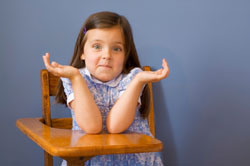Public or Private?

Daniel attended private school until sixth grade, when he was diagnosed with Asperger’s Syndrome, a form of high-functioning autism. Even though Daniel set the curve in all of his classes the school told his parents that they did not have the ability to care for a “special needs” student. He spent his middle school years in public school.
Second grade Emma’s parents wanted to get her into the charter school her older siblings attend, but was not able to get in this year. She will attend the local public elementary school, where half of her classmates will not speak English as a first language.
Nathan attended a small private school through eighth grade. After middle school, he decided to attend a public high school, a magnet school, to study computers. His private school was unable to afford him this opportunity.
Lucas started first grade right after his parents’ divorce. He attended the local public school and was one of 30 kids in his class. He developed emotional problems stemming from the divorce and fell through the cracks until his mother put him in a private school.
Brooke attended public school through the 8th grade, but her parents pulled her out of public school when she started bringing home things her parents didn't approve of. She was used to the larger public school, and she didn’t fit well in the smaller classes.
Both public and private schools have their advantages and disadvantages. The trick is finding the right fit for your student.
Public school has some obvious-and some less obvious-advantages. For parents who cannot afford private school, public school is the only option. For Nathan, Brooke, and Daniel, public school offered something that private school couldn’t: more opportunity. Some private schools are not equipped to handle special needs kids. For Brooke, private school didn’t hold enough opportunity for friends. Nathan, in attending a magnet school, was able to focus his attention on technology and thereby chose with a better understanding what he wanted to do later in life.
Private school-including home schooling-has its advantages, and for some parents, those outweigh any disadvantages.
Private schools do have a smaller class size. Teachers can focus more on their students, and it’s harder for troubled students to fall through the cracks. Parents and teachers also share a closer relationship, so any potential problems can be addressed quickly. Many private schools either require or offer religious training alongside traditional curriculum. They also tend to better prepare students for college and the rest of their lives.
But private schools also have their disadvantages. As Brooke-who was very excited to go to school with her best friend-found out, private schools can be very small and socially-limiting. If your student is good at sports, he or she may be much more appreciated at a smaller private school; but smaller schools are not usually 4-A teams. While your student may get more playing time and have more opportunity for advancement in the team, they may not get the attention you may think they deserve because of the smaller league.
To find the right school for your student, take a few things into consideration:
1. What is your child used to? If your child is used to a large class and school, then putting them in a smaller school may not be the best place for them.
2. Does your child have special needs? If your child has any special needs-learning disorders such as dyslexia, mental or developmental issues, emotional issues such as depression or anger, severe allergies, etc.-and you are looking for a private school, you should ask questions to make sure the school is equipped to handle your child.
3. If your primary concern about private school is financial, sit down and consider your priorities. Maybe you’ll learn you can live without the morning latte from Starbucks, but harder decisions come when you’re faced with working longer hours to pay for school.
4. Do you have any religious convictions, etc., that you want emphasized at school? Public schools are required by threats of lawsuit to stay away from teaching about religion. If you want your student to have a religious-centered education, public school probably isn’t for you.
Schooling is very important to students, and getting a good education can make all the difference in the rest of your life. The bulk of childhood is spent in school, and making school as an enjoyable experience as it can be will cultivate a love of learning that can be carried on throughout life.
- Homework Tips: Taking the Work out of HomeworkKids hate homework. It seems that almost every night of the week they are overloaded with assignments and projects. Teachers give children homework to ensure all class work is completed and so they...
- Assisting Students to Overcome Test AnxietyEvery human copes with anxiety at one time or another. It is a basic emotion that we feel when something is perceived as a threat. Anxiety is a valuable tool, which humans use to avoid danger....
- School Lunches ... Hot or Cold?First there were four, now there are six, no one knows how many more there may be in the future. The four original food groups were tossed out a long time ago. The food pyramid, also, seems to be on...
- Is Your Child's Teacher a Bully?We’ve all heard about kids being bullied by peers. Kids taunt, tease, pull hair, shove and push each other on a daily basis. In recent years, schools have taken steps to stop bullying and many have a...
- All About BackpacksYour child riffles through his backpack to find homework assignments, his MP3 player, lunch money and his Game Boy games. He shoves it into the bottom of his locker, shoves it under the seat on the...

